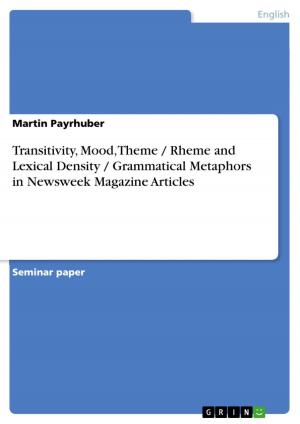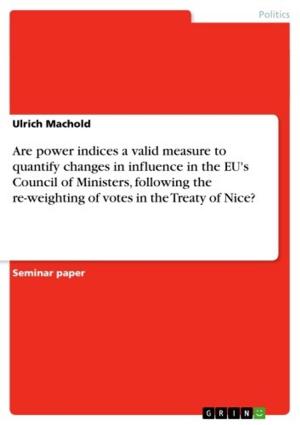| Author: | Michael Helten | ISBN: | 9783638515740 |
| Publisher: | GRIN Publishing | Publication: | July 1, 2006 |
| Imprint: | GRIN Publishing | Language: | English |
| Author: | Michael Helten |
| ISBN: | 9783638515740 |
| Publisher: | GRIN Publishing |
| Publication: | July 1, 2006 |
| Imprint: | GRIN Publishing |
| Language: | English |
Seminar paper from the year 2005 in the subject Sociology - Consumption and Advertising, grade: 1,0, State University of New York at Stony Brook (Linguistics), course: Sociolinguistics Seminar, 3 entries in the bibliography, language: English, abstract: Gemanagte Dachfonds Die Office in your Pocket-Lösung Power ist nichts ohne Kontrolle To any native English speaker, the slogans above have to seem remarkable, mostly because of the obvious mix of English and German. What might be most remarkable about them, however, is the 'very lack of remarkability with which they are received' (KELLY-HOLMES 67) by German consumers when they are encountered as parts of magazine advertisements. Along with numerous other examples, these three items were extracted from the acclaimed weekly German news magazine 'Der Spiegel' in order to get a clear picture of which effects English has and which role it plays in German advertisement. This paper will argue that English has an effect on virtually all of the 114 ads examined in the Spiegel issues of 4/11 and 4/18 2005, even on the ones that do not contain any English themselves. Furthermore, it will show that the effect English has on German ads extends beyond the concepts usually related with English, like technology, modernity, or science. This is a finding similar to the one suggested by MARTIN in a study on English influences on French advertisements. In her study, she also stresses that the register of advertisement is a very special one due to its one-way form of communication (MARTIN 376). Since the hearer remains hearer and can never take over the floor, he is not required to have any active knowledge of the language used in ads. This way, language can become a tool and a symbol all by itself, while the content can become secondary - language can turn into a form without meaning. In how far this is true in the case of English in German ads will be a final concern of this paper.
Seminar paper from the year 2005 in the subject Sociology - Consumption and Advertising, grade: 1,0, State University of New York at Stony Brook (Linguistics), course: Sociolinguistics Seminar, 3 entries in the bibliography, language: English, abstract: Gemanagte Dachfonds Die Office in your Pocket-Lösung Power ist nichts ohne Kontrolle To any native English speaker, the slogans above have to seem remarkable, mostly because of the obvious mix of English and German. What might be most remarkable about them, however, is the 'very lack of remarkability with which they are received' (KELLY-HOLMES 67) by German consumers when they are encountered as parts of magazine advertisements. Along with numerous other examples, these three items were extracted from the acclaimed weekly German news magazine 'Der Spiegel' in order to get a clear picture of which effects English has and which role it plays in German advertisement. This paper will argue that English has an effect on virtually all of the 114 ads examined in the Spiegel issues of 4/11 and 4/18 2005, even on the ones that do not contain any English themselves. Furthermore, it will show that the effect English has on German ads extends beyond the concepts usually related with English, like technology, modernity, or science. This is a finding similar to the one suggested by MARTIN in a study on English influences on French advertisements. In her study, she also stresses that the register of advertisement is a very special one due to its one-way form of communication (MARTIN 376). Since the hearer remains hearer and can never take over the floor, he is not required to have any active knowledge of the language used in ads. This way, language can become a tool and a symbol all by itself, while the content can become secondary - language can turn into a form without meaning. In how far this is true in the case of English in German ads will be a final concern of this paper.















